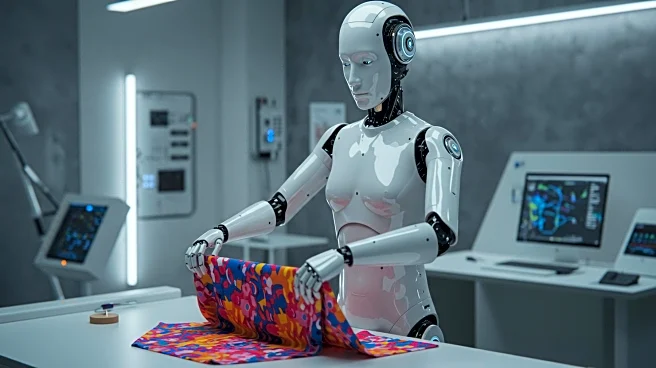What's Happening?
The Figure 02 humanoid robot has showcased its ability to fold towels in a recent demonstration, highlighting advancements in AI and robotics aimed at automating household chores. The demo revealed that the robot can fold towels at a rate of approximately 22 seconds per towel. This development is part of a broader effort by companies to explore the domestic capabilities of AI robots. Figure CEO Brett Adcock has also released a video showing the robot performing other laundry tasks, such as crouching down to add clothes to a washing machine. Other companies, like 1X, are also developing humanoid robots designed for household chores, including carrying laundry baskets and loading washing machines.
Why It's Important?
The demonstration of Figure 02's capabilities represents a significant step towards the integration of AI and robotics in everyday household tasks. This could potentially transform domestic life by reducing the time and effort required for chores, thereby freeing up time for other activities. The development of such technology could have wide-ranging implications for industries related to home appliances and robotics, potentially leading to new market opportunities and innovations. As these technologies become more advanced, they may also influence labor markets, particularly in sectors related to domestic work.
What's Next?
As AI and robotics continue to advance, further demonstrations and developments are expected in the realm of automated household chores. Companies may focus on enhancing the efficiency and capabilities of these robots, potentially expanding their functions beyond laundry tasks. Stakeholders, including tech companies and consumers, will likely monitor these advancements closely, considering the implications for convenience and lifestyle changes. Additionally, discussions around ethical and practical considerations of AI in domestic settings may arise, influencing future developments and regulations.
Beyond the Headlines
The integration of AI and robotics into household tasks raises questions about privacy, security, and the ethical use of technology in personal spaces. As robots become more prevalent in homes, there may be concerns about data collection and the potential for surveillance. Furthermore, the cultural acceptance of robots performing domestic tasks could vary, influencing how quickly these technologies are adopted. Long-term shifts in societal norms regarding household labor and the role of technology in daily life may also emerge.









